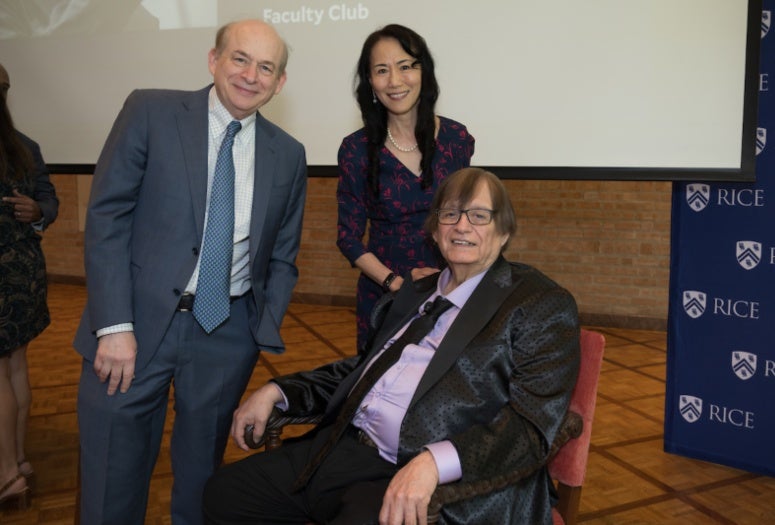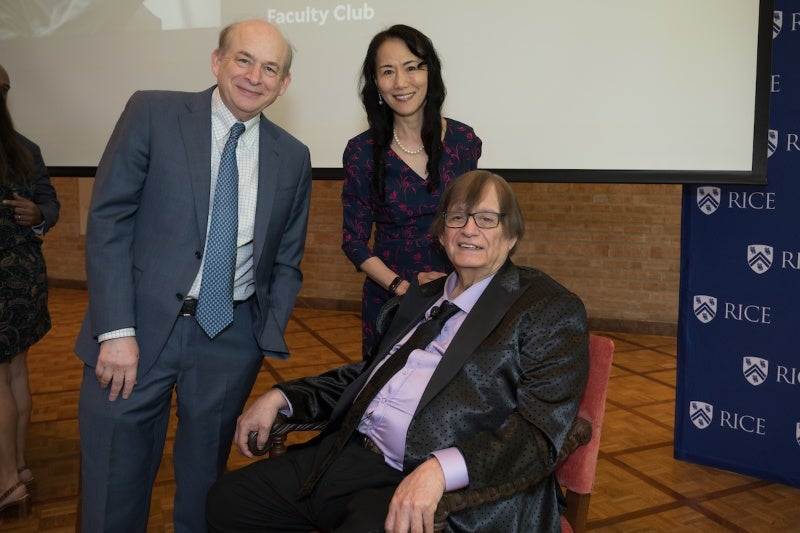
National Medal of Science winner Richard Tapia, a University Professor, the Maxfield-Oshman Professor in Engineering and professor of computational applied mathematics and operations research at Rice University, was celebrated for five decades of service to the university April 3 at Rice’s Faculty Club. He is widely recognized as a national leader in the preparation of women and underrepresented minorities for advanced degrees in science, engineering and mathematics.
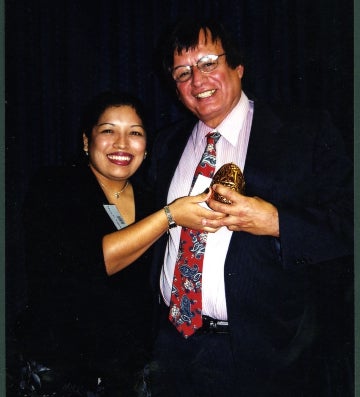
In addition, he was announced as this year’s recipient of the Y. Ping Sun Award for Outstanding Community Engagement, one of the university’s top honors which is named after the wife of former Rice President David Leebron and highlights a Rice community member who has demonstrated devoted service to the city of Houston.
The event was emceed by Rice alumna and partner with Diamond McCarthy LLP Sofia Adrogué, and it involved a who’s-who list of speakers, including Rice President Reginald DesRoches; Howard R. Hughes Provost and Executive Vice President for Academic Affairs Amy Dittmar; William and Stephanie Sick Dean of Engineering Luay Nakhleh; ExxonMobil’s Public and Stakeholder Engagement Manager Nicolas Medina; and Sun, who all heralded Tapia’s impact throughout his career.
“Richard’s influence at Rice extends beyond his academic contributions, encompassing diversity advocacy, mentorship and leadership,” DesRoches said. “Richard has been a leading figure in promoting diversity and inclusion in STEM fields. At Rice, he has been instrumental in fostering a diverse and inclusive environment, particularly in the department of computational and applied mathematics. Throughout his career, he has advocated for underrepresented minorities, women and individuals from disadvantaged backgrounds to pursue careers in mathematics and related fields.”
Dittmar also included her praises, taking special notice of Tapia’s work with area youth via the eponymous Tapia STEM Camps.
“Since their inception in 2015, the Tapia Camps have grown to more than 1,600 students,” Dittmar said. “The weeklong camps emphasize excellence and equity and integrate campers into the life of the university. These emerging scientists learn directly from Rice students, professors, industry professionals and Professor Tapia himself. The camps develop students’ technical skills and communication capabilities, ultimately creating a sense of confidence and belonging. Camp alumni have gone on to attend Rice, Brown, Dartmouth, Harvard, Yale, Tufts, UT Austin and the University of Houston.”
Former President Barack Obama, who has previously lauded Tapia’s achievements, sent a letter to thank him for his work. The letter was projected on a screen and read aloud by Adrogue to thunderous applause.
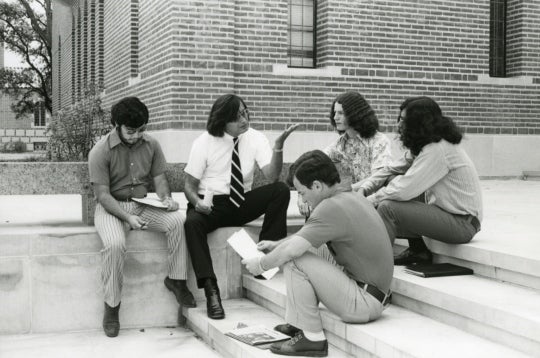
“Throughout your years as an educator, you have laid the foundation for a brighter tomorrow by recognizing the limitless potential in every student who crossed your path,” Obama’s letter read. “In doing so, you have made a lasting impact―not only on their lives, but also on the future of the world they will inherit.”
Tapia also took a few moments to include his own thoughts about his experience, which included a video that demonstrated his passion for mathematics and shaping students’ lives.
“I’ve lived a life, and [I’ve taken different] paths,” Tapia said, referencing his journey from an underserved youth to an instructor at an elite university. “I’ve learned a lot. I have a lot to share. As I see students who are similarly situated like I was in high school, I want to share with them all the things I’ve learned, help them and guide them. One of my messages is that if you don’t achieve everything you’ve dreamed of, it’s still a wonderful life.”
For Tapia, though, his credentials and accolades comprise a career any young researcher would dream of.
At Rice, Tapia serves as the director of the Rice Graduate Education for Minorities and Empowering Leadership Alliance programs and the Center for Excellence and Equity in Education and as an associate director of graduate studies in the Office of Research and Graduate Studies.
His five decades of service to the academy are also punctuated by recognition both from industry peers and national leaders. In 1992, Tapia became the first Hispanic elected to the National Academy of Engineering. In 1996, President Bill Clinton appointed him to the National Science Board, where he served until 2002, and from 2001-04 he chaired the National Research Council’s Board on Higher Education and the Workforce.
Because of his leadership, Rice is recognized as a national leader in the preparation of women and underrepresented minority doctoral degree recipients in science, engineering and mathematics.
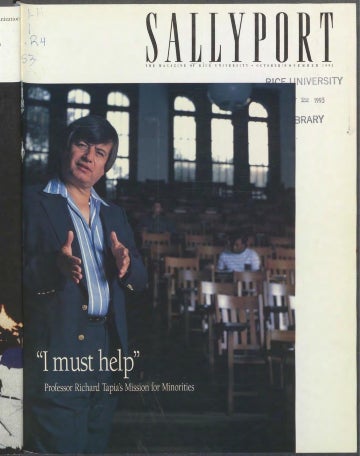
Among his numerous other laurels is the National Science Board’s Vannevar Bush Award, which made Tapia the first Hispanic to receive this honor. Two professional conferences have been named after him: the Richard Tapia Celebration of Diversity in Computing Conference and the Blackwell-Tapia Mathematics Conference.
Tapia received the National Science Foundation’s inaugural Presidential Award for Excellence in Science, Mathematics and Engineering Mentoring; the Lifetime Mentor Award from the American Association for the Advancement of Science; the Distinguished Service to the Profession Award from the Society for Industrial and Applied Mathematics; the Distinguished Public Service Award from the American Mathematical Society; and the Distinguished Scientist Award from the Society for the Advancement of Chicanos and Native Americans in Science.

